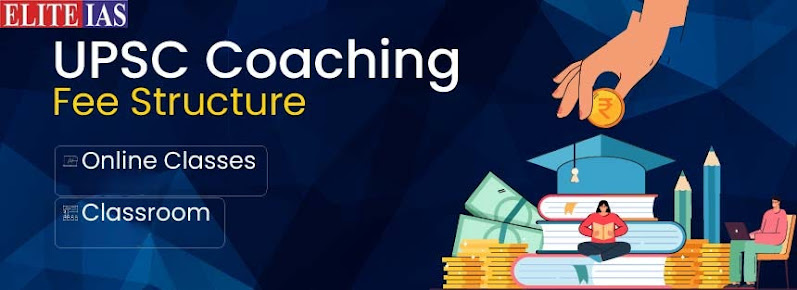The journey to becoming a successful Indian Administrative Service (IAS) officer is highly competitive, and for many aspirants, joining a coaching institute in Delhi is an essential step. Delhi is renowned for its top-tier IAS coaching centers, but fees can vary significantly. Understanding the factors influencing IAS coaching in Delhi fees can help aspirants make informed decisions. Here's a breakdown of the key aspects that affect these fees:
1. Reputation of the Coaching Institute
Top IAS coaching centers in Delhi, like Vajiram & Ravi, Drishti IAS, and ALS IAS, charge higher fees due to their established reputation. Their success rate, experienced faculty, and long-standing history in producing toppers contribute to the higher cost. The brand name often signifies quality, but it comes at a price.
2. Study Material and Resources
The quality and comprehensiveness of study material provided by the institute play a significant role in the overall cost. Institutes that offer meticulously curated books, notes, and online resources tend to charge more. Updated study material, especially for current affairs and changes in the exam pattern, can be costly but is essential for cracking the IAS exam.
3. Batch Size
Batch size directly affects the cost of IAS coaching in Delhi. Institutes offering smaller batches generally charge higher fees as students receive more personalized attention and individual mentoring. Larger batches may have lower fees, but the one-on-one interaction with faculty might be limited, impacting the overall learning experience.
4. Faculty Experience
The qualifications and expertise of faculty members significantly influence the fees of an IAS coaching institute. Centers with highly experienced, knowledgeable, and renowned faculty members charge higher fees due to the premium mentorship they provide. Many aspirants prefer coaches with proven track records in guiding students to success.
5. Optional Subject Coaching
Along with general studies, IAS coaching also includes optional subjects. Some institutes offer specialized coaching for various optional subjects like Geography, History, or Public Administration, which comes at an additional cost. The choice of an optional subject can sometimes affect the overall coaching fees, depending on the demand and availability of expert teachers.
6. Duration of the Course
The length of the IAS preparation course affects the fees. Institutes that offer one-year comprehensive programs might have different pricing from those offering shorter, intensive crash courses or long-term foundational programs. The longer the duration, the higher the overall fees, but longer courses typically cover the syllabus more comprehensively.
7. Location of the Institute
Delhi’s different regions have varying rent and infrastructure costs, which influence the coaching fees. Institutes located in prime areas such as Rajinder Nagar, Mukherjee Nagar, or Karol Bagh often charge higher fees due to their accessibility and infrastructure. Rent and operational costs in these popular educational hubs are typically higher.
8. Online vs. Offline Mode
With the increasing shift toward online education, many IAS coaching institutes in Delhi now offer online courses, which are often more affordable than traditional classroom programs. Online coaching eliminates costs associated with infrastructure, and institutes can pass these savings on to students. However, classroom-based programs, which provide face-to-face interaction, often come with higher fees due to the added overhead.
9. Test Series and Mock Exams
The inclusion of comprehensive test series and regular mock exams is a critical component of IAS preparation. Institutes that offer frequent, well-structured test series tend to charge more. These mock tests simulate real exam conditions and are vital for assessing an aspirant's preparedness, making them a valuable, but potentially costly, addition.
10. Extracurricular Support
Some coaching centers offer additional services, such as personality development sessions, interview guidance, and one-on-one mentoring. Institutes providing these extra services tend to charge higher fees, as these sessions are integral to cracking the IAS exam, especially the interview stage, which demands strong communication and confidence.
11. Infrastructure and Facilities
The quality of infrastructure—such as modern classrooms, libraries, and access to technology—also plays a role in determining the fees of IAS coaching institutes in Delhi. Institutes that provide comfortable and well-equipped learning environments, air-conditioned classrooms, and digital teaching aids charge higher fees. The learning atmosphere can influence an aspirant's motivation and productivity.
12. Demand and Competition
The competitive nature of IAS coaching in Delhi means that demand can significantly affect fees. During peak admission seasons, some institutes may increase their prices due to high demand. Additionally, institutes that consistently produce toppers often see an influx of students, allowing them to charge a premium for their services.
Conclusion
When considering IAS coaching in Delhi fees, it is essential to weigh the cost against the benefits provided by the institute. While expensive coaching centers may offer more in terms of resources, faculty, and personal attention, it’s crucial to choose an institute that aligns with your learning style, budget, and preparation needs. Carefully evaluating these 12 factors can help you make the right choice for your IAS journey.

Comments
Post a Comment